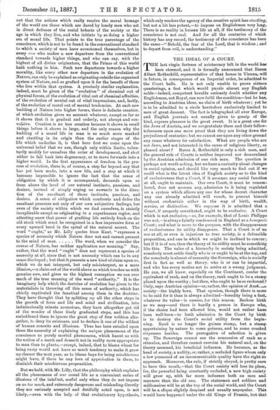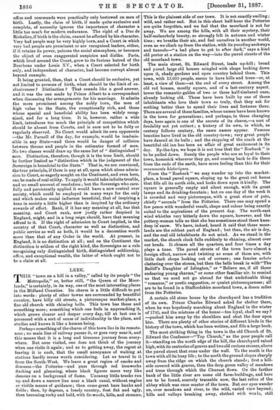THE IDEAL OF A COURT.
THE last virgin fortress of aristocracy left in the world has been stormed, and it is formally announced that Bann Albert Rothschild, representative of that house in Vienna,-will in future, in consequence of an Imperial order, be admitted to the Court balls. He is not only unable to prove sixteen quarterings, a feat which would puzzle almost any English noble—indeed, competent heralds seriously doubt whether any Englishman, not Royal, can now fulfil the condition—but be has, according to Austrian ideas, no claim of birth whatever ; yet he is to be admitted to a circle heretofore exclusively limited to men of great descent. The fact is telegraphed all over Europe, and English journals not usually given to gossip of the kind, express pleasure in the great event. It is a great one for the Jews of Austria, and we congratulate them and their fellow- tribesmen upon one more proof that they are living down the prej adieu; of centuries; but we cannot see upon any other ground any cause whatever for satisfaction. What are people who are not Jews, and not interested in the cause of religious liberty, so pleased about P Baron A. Rothschild is only a rich man, and the general rule of Courts is neither improved nor demoralised by the Austrian admission of one rich man. The question is perhaps not worth asking, but we have a curiosity about changes in social opinion, and should like very much to find out if we could what is the latent idea of English society as to the kind of exclusiveness that a Court, if it assumes any social function at all, ought to maintain. Our own Court, it must be remem- bered, does not assume any, admission to it being regulated on a system which allows any one for whose decent character any one already admitted will vouch, to present himself without credentials either in the way of birth, wealth, service, or distinction. We suppose it is admitted that a Court, if properly constituted, ought to be exclusive. A Court which is not exclusive, —as, for example, that of Louis Philippe was not,—is always faintly condemned in England as a bourgeois Court ; and what is more to the purpose, with the disappearance of exclusiveness its utility disappears. That a Court is of -no use at all, or even is injurious to true society, is a defensible proposition, and one in which we might be inclined to concur; but if it is of use, then the theory of its utility must be something like this. The value of a hierarchy in society being admitted, somebody most settle finally who is or ought to be at the top, and the somebody is almost of necessity the Sovereign, who is socially first in fact as well as theory, who is or can be impartial, and who has every motive not to arrive at a wrong judgment. He can, we all know, especially on the Continent, confer the equivalent of rank, and on the theory, rank ought to be a stamp placed upon the worthy ; but then, who ought to be so reckoned ? Only, says Austrian opinion—or, rather, the opinion of Ausf.,..0 society—the highly born. That opinion, though there is more to be said for it than is always admitted—heredity being a fact, whatever its value—is unwise, for this reason. Reckon birth as we may—and there is hardly a person in Europe who, if the choice had been allowed him, would not rather have been well-born—to limit admission to the Court by birth is to destroy the Court's social utility from the begin- ning. Rank is no longer the guinea stamp, but a stamp appertaining by nature to some guineas, and to some crooked sixpences besides. The prerogative of selection is given np. The Sovereign cannot use the concession of rank as a stimulus, and therefore cannot exercise his natural and, on the theory assumed, his beneficial influence. He becomes, as the head of society, a nullity, or, rather, a secluded figure whom only a few possessed of an incommunicable quality have the right. to approach. Moreover, the rule,. if strictly obeyed, is pretty sure to have this result, —that the Court society will lose its place, for, the powerful being constantly excluded, a new high society will grow up, with far more influence both on men and manners than the old one. The statesmen and soldiers Kid millionaires will be at the top of the social world, and the Court will be a clique slightly despised and usually unpopular. This would have happened under the old Kings of Prussia, but that
office and commands were practically only bestowed on men of birth. Lastly, the claim of birth, if made quite exclusive and complete, of necessity ignores the importance of character a little too much for modern endurance. The right of a Duo de Richelieu, if birth is the claim, cannot be affected by his character. Very bad people may be very highly born, and a Court in which very bad people are prominent or are recognised leaders, either, if it retains its power, poisons the social atmosphere, or becomes the object of even exaggerated suspicion and dislike. Paris, which lived around the Court, grew to its furious hatred of the Bourbons under Louis XV., when a Court selected for birth only, and independent of character, had become corrupt almost beyond example.
It being granted, then, that a Court should be exclusive, yet not limited to persons of birth, what should be the limit of ex- clusiveness? Distinction ? 'that sounds like a good answer, and it was the one made by Prince Albert to a correspondent when discussing the arrangements for his marriage. It admits the more prominent among the nobly born, the men of high value to the State, the exceptionally rich, and those whose special and beneficial ability has been widely recog- nised, and for a long time. It is, however, rather a wide limit, introduces too much the principle of competition which should be absent from Courts, and is sure not to be folly or regularly observed. No Court would admit its own opponents —the Mr. Parnell of the day, for example, would be inadmis- sible in any State—and there would be danger of collision between throne and people in the estimates formed of men. No two classes would draw up the same list of " distinguished " men. Distinction, therefore, though it is the true limit, should be further limited as "distinction which in the judgment of the Sovereign is beneficial to the State." That is, we are convinced, the true principle, if there is any at all, upon which alone admis- sion to Court, so eagerly sought on the Continent, and even here, can be made of real utility. To apply it would take infinite trouble, and no small amount of resolution ; but the Sovereign who care- fully and persistently applied it would have a new control over society, which could be employed in many ways for the only end which makes social influence beneficial, that of inspiring a tone in society a little higher than is inspired by the ordinary rewards of effort. Rank, if it has any meaning at all, has that meaning, and Court rank, now justly rather despised in England, might, and in a long reign should, have that meaning affixed to it. If the right of admission to Court implied, in the country of that Court, character as well as distinction, and public service as well as both, it would be a decoration worth more than that of any Order in the world. At present, in England, it is no distinction at all ; and on the Continent the distinction is seldom of the right kind, the Sovereigns as a rule vecognising only distinguished birth, distinguished soldiership, -office, and exceptional wealth, the latter of which ought not to be a claim at all.







































 Previous page
Previous page